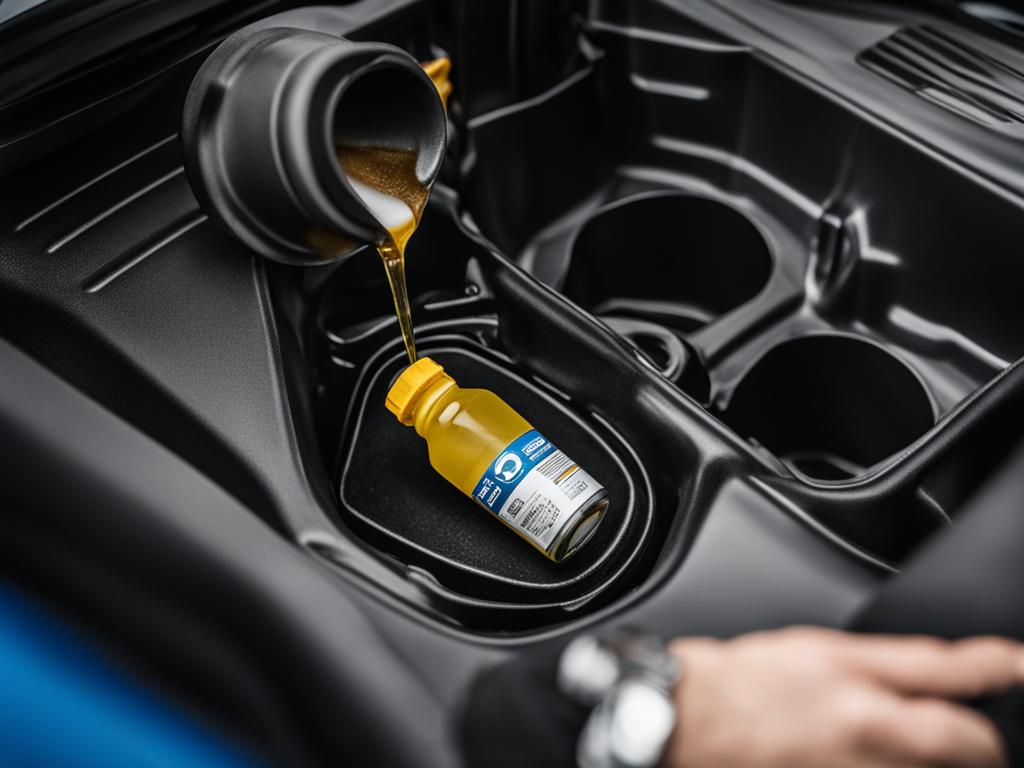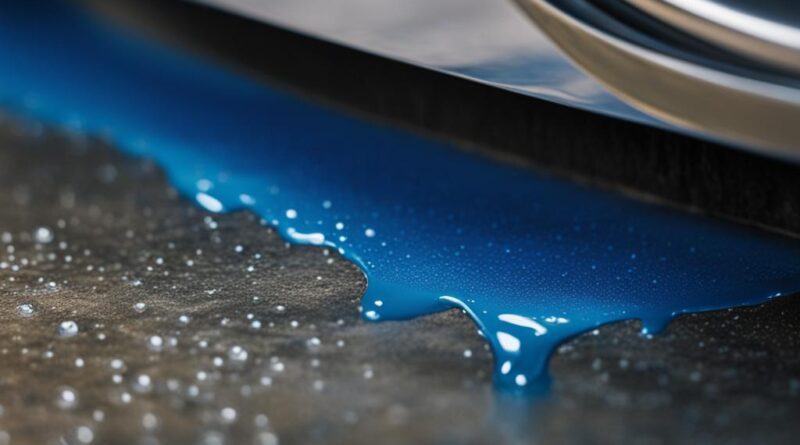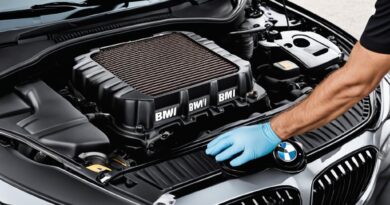BMW Brake Fluid Service: Ensure Safe Driving
Regular brake fluid service is crucial for maintaining the safety and performance of your BMW. By keeping your brake system in top condition, you can ensure optimal braking efficiency and safe driving on the road.
According to BMW, the recommended interval for a brake fluid flush is approximately every two years. However, it is important to note that this frequency can vary depending on various factors such as driving habits, climate conditions, and the specific model of your BMW.
Key Takeaways:
- Regular brake fluid service helps maintain the integrity of your BMW’s braking system.
- Contaminated brake fluid can compromise braking efficiency and safety.
- BMW recommends a brake fluid flush every two years as a baseline.
- Consider additional factors such as aggressive driving and extreme climate conditions for more frequent brake fluid service.
- Consulting with a qualified mechanic or BMW specialist can provide personalized advice based on your specific needs.
Importance of Brake Fluid Service for BMW Vehicles
Brake fluid plays a crucial role in the functioning of your BMW’s braking system. It acts as a medium to transfer the force from the brake pedal to the brakes themselves, enabling smooth and efficient stopping power. However, over time, brake fluid can accumulate moisture, debris, and other contaminants, compromising its effectiveness and potentially jeopardizing your BMW’s braking performance and safety.
Regular brake fluid service is essential to maintain optimal brake function and ensure peak braking safety and reliability on the road. By flushing and replacing the old fluid, you eliminate the contaminants that can hamper brake performance. This helps restore your BMW’s braking system to its optimal condition, ensuring that your vehicle responds promptly and effectively when you apply the brakes.
It’s important to note that BMW recommends a brake fluid change approximately every two years. However, factors such as driving habits, climate conditions, and the specific model of your BMW can also influence the frequency of brake fluid maintenance. To keep your BMW’s braking system in top shape, it’s a good idea to consult your owner’s manual or seek advice from a trusted BMW mechanic or specialist.
By prioritizing brake fluid service for your BMW vehicle, you can demonstrate a proactive approach to maintenance and prioritize your safety on the road. Don’t wait until you notice a decline in braking performance or experience warning signs such as a spongy brake pedal or reduced stopping power. Instead, make regular brake fluid service an integral part of your BMW maintenance routine to ensure optimal braking performance and peace of mind.
Recommended Brake Fluid Flush Interval for BMWs
Brake fluid plays a critical role in the performance and safety of your BMW’s braking system. Over time, brake fluid can become contaminated with moisture and debris, compromising its effectiveness and potentially leading to brake failure. Regular brake fluid service is essential to maintaining optimal braking performance and ensuring your safety on the road.
According to BMW, the recommended interval for a brake fluid flush is approximately every two years. This timeframe serves as a baseline guideline for preserving the integrity of your BMW’s braking system. However, it is important to consider additional factors that may warrant more frequent brake fluid service.
Aggressive driving: If you frequently engage in spirited driving or track events with your BMW, it is recommended to have a brake fluid flush more often than the recommended interval. The intense braking forces experienced during aggressive driving can generate higher temperatures, causing the brake fluid to degrade more quickly.
Extreme climate conditions: If you live in an area with extreme temperatures, such as very hot or cold climates, it can accelerate brake fluid degradation. Extreme temperatures can cause the brake fluid to expand or contract, potentially leading to poor brake performance. In such cases, more frequent brake fluid service may be necessary.
To determine the optimal brake fluid service schedule for your BMW, it is recommended to consult with a trusted BMW specialist. They can provide personalized advice based on your specific driving conditions and model.
| Factors to consider for brake fluid service interval |
|---|
| Recommended interval by BMW |
| Aggressive driving |
| Extreme climate conditions |
By proactively maintaining the condition of your brake fluid, you can ensure optimal brake performance and enhance your driving experience in your BMW.

Trusted BMW Specialists
When it comes to brake service for your BMW, it’s important to entrust your vehicle to experienced and qualified professionals. Seek out reputable BMW specialists who have in-depth knowledge of the braking system and use genuine BMW parts for any replacements or repairs.
Choose a service center that specializes in BMW maintenance and has a track record of excellent customer satisfaction. By relying on expert technicians, you can have peace of mind knowing that your BMW’s brake fluid service is conducted with the utmost care and precision.
Understanding the BMW Brake System
BMW vehicles are renowned for their exceptional braking capabilities, which can be attributed to advanced braking technologies and high-performance components. The brake system in a BMW is meticulously designed to deliver precise and responsive braking, ensuring both safety and optimal performance on the road.
The BMW braking system is a complex network of components that work together to bring your vehicle to a stop efficiently and effectively. These components include:
- Brake calipers
- Brake pads
- Brake rotors
- Brake lines
- Anti-lock Braking System (ABS)
Each component plays a crucial role in the overall function of the brake system. For instance, when you press the brake pedal, the brake calipers apply pressure to the brake pads, which then make contact with the brake rotors, creating friction and slowing down the wheels. The brake lines transport brake fluid, which enables hydraulic pressure to be applied to the calipers.
Regular brake fluid service is crucial for preserving the integrity of the BMW brake system. It ensures that the brake fluid remains clean, free from contaminants, and at the optimal level. Contaminated brake fluid can negatively impact the performance of the brake system, leading to decreased braking efficiency and potential safety issues.
The brake fluid service involves flushing out the old brake fluid and replacing it with fresh, high-quality fluid that meets BMW’s specifications. This process helps remove any moisture, debris, or other contaminants that may have accumulated over time.
By maintaining the high standards of BMW’s braking efficiency through regular brake fluid service, you can drive with confidence, knowing that your BMW’s braking system will perform at its best when you need it the most.
Performing a Brake Fluid Service for Your BMW
When it comes to maintaining the safety and performance of your BMW, regular brake fluid service is crucial. Following a systematic approach ensures that the brake fluid is properly flushed and replaced, guaranteeing optimal braking efficiency. Here’s a step-by-step guide to performing a brake fluid service for your BMW:
- Prepare the necessary tools: Before starting the service, gather the required tools and equipment. This may include a wrench, pliers, a pressure bleeder, and a container to collect the old brake fluid.
- Locate the brake fluid reservoir: The brake fluid reservoir is usually located under the hood of your BMW. Refer to the owner’s manual or consult a qualified mechanic if you’re unsure about its location.
- Drain the old brake fluid: Use a wrench or pliers to remove the cap of the brake fluid reservoir. Place the container beneath the reservoir to catch the old brake fluid as it drains out.
- Flush the brake system: Attach the pressure bleeder to the brake fluid reservoir and follow the manufacturer’s instructions for the proper amount of pressure. This will help flush out the old brake fluid from the hydraulic system.
- Refill with fresh brake fluid: Once the old fluid is fully drained, remove the pressure bleeder and refill the reservoir with fresh brake fluid that meets the manufacturer’s specifications. Ensure that the brake fluid level is within the recommended range.
- Bleed the brake system: To remove any air bubbles from the brake system, perform a brake bleeding procedure. Follow the specific instructions for your BMW model to complete this step accurately.
- Check for leaks: Before finishing the brake fluid service, carefully inspect the brake lines and connections for any signs of leaks. Address any leaks promptly to maintain the integrity of your BMW’s braking system.
It is essential to consult the owner’s manual for detailed instructions and recommended procedures specific to your BMW model. If you’re unsure about performing the brake fluid service yourself, it is recommended to seek the assistance of a qualified mechanic who specializes in BMW vehicles.
Performing regular brake fluid service for your BMW helps ensure safe driving and maintains optimal braking performance. By following the proper steps and using the right equipment, you can keep your BMW’s braking system in top condition, providing peace of mind on the road.
Conclusion
Maintaining your BMW’s brake fluid is crucial for ensuring safe driving and peak braking performance. Regular brake fluid service, such as a flush or change, is recommended by BMW to keep your braking system in optimal condition. While the manufacturer suggests a brake fluid flush every two years, it is advisable to consider a more frequent interval of every 18 to 24 months to ensure the best results.
By adhering to the manufacturer’s recommendations and taking into account factors such as your driving habits and climate conditions, you can effectively preserve the integrity of your BMW’s braking system. Proper brake fluid service helps remove contaminants and moisture that can degrade the performance of your brakes and compromise your safety on the road.
To ensure accuracy and personalized advice, it is advisable to consult with a knowledgeable mechanic or BMW specialist. They can provide specific recommendations based on your BMW model and address any concerns or questions you may have regarding brake fluid service. With regular brake fluid maintenance, you can maximize your driving experience and enjoy the unparalleled braking capabilities that BMW vehicles are renowned for.
FAQ
How often should I get a brake fluid flush for my BMW?
BMW recommends a brake fluid flush approximately every two years. However, experts often suggest a more frequent schedule of every 18 to 24 months for optimal performance and safety. The specific interval may vary based on factors such as driving habits, climate conditions, and your BMW model.
Why is brake fluid service important for BMW vehicles?
Brake fluid is a vital component of your BMW’s braking system as it transfers the force from the brake pedal to the brakes themselves. Over time, brake fluid can become contaminated with moisture, debris, and other contaminants, which can affect its performance and compromise your BMW’s braking efficiency and safety. Regular brake fluid service helps remove these contaminants and ensures optimal brake function, maintaining peak braking safety and reliability on the road.
What is the recommended brake fluid flush interval for BMWs?
BMW recommends a brake fluid flush approximately every two years as a baseline guideline for maintaining the integrity of your BMW’s braking system. However, additional factors like aggressive driving or extreme climate conditions may warrant more frequent brake fluid service. It is advisable to consult with a trusted BMW specialist to determine the ideal frequency based on your specific driving conditions and BMW model.
What should I know about the BMW braking system?
BMW vehicles are known for their exceptional braking capabilities, thanks to advanced braking technologies and high-performance components. The brake system in a BMW is designed to deliver precise and responsive braking, ensuring safety and optimal performance. Regular brake fluid service is crucial for preserving the integrity of this system and maintaining the high standards of BMW’s braking efficiency.
How do I perform a brake fluid service for my BMW?
When performing a brake fluid service for your BMW, it is essential to follow a systematic approach. This involves draining the old brake fluid from the hydraulic system and replacing it with fresh fluid that meets the manufacturer’s specifications. The process may require the use of specialized tools like a pressure bleeder to ensure a proper and thorough flush. It is recommended to consult the owner’s manual or seek the assistance of a qualified mechanic for accurate instructions and guidance specific to your BMW model.




